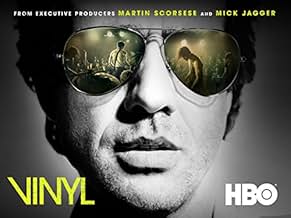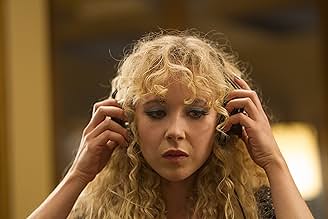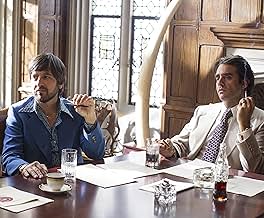Richie Finestra considers selling his struggling record company; Richie takes a detour to an unplanned reunion with Lester Grimes; Richie orders his A&R department to find new acts; Richie j... Read allRichie Finestra considers selling his struggling record company; Richie takes a detour to an unplanned reunion with Lester Grimes; Richie orders his A&R department to find new acts; Richie jeopardizes his relationships with his wife and children.Richie Finestra considers selling his struggling record company; Richie takes a detour to an unplanned reunion with Lester Grimes; Richie orders his A&R department to find new acts; Richie jeopardizes his relationships with his wife and children.
Featured reviews
Vinyl is also produced by Mick Jagger which explains how his son has a major role in the series, he certainly did not get the part through talent.
We are at a grungy, grainy 1970s. Part gangster, part Spinal Tap and part the fallen ruins from the hedonism of the 1960s but with a great soundtrack and some stylish scenes, especially if they involve music.
Record executive Richie Finestra (Bobby Cannavale) sits downhearted in his car, drunk, on drugs when the he sees some excited teens going to a club and he follows. He see the proto punk band The New York Dolls who certainly bring the roof down.
We have flashbacks to Finestra in the 1960s making his way to the top, trying to find acts that could make it big, he likes blues artists but they do not sell records unless they conform to pop sounding hits.
In the present he is trying to sell his record company to a big German corporation but they are only interested if Finestra signs Led Zeppelin but manager Peter Grant is having none of Finestra's crap.
Also his personal life is collapsing and there is a dead body to get lid off when an altercation gets too hot headed.
Scorsese in the pilot episode wants to unveil an epic saga, but outside of the music it was just not interesting enough. The episode mixes fact with fiction as you see Finestra talking to Zeppelin and then fake acts.
Violence, drug use, sex, corporate shenanigans (and modern vocabulary). We have the wild hedonism of the early 1970s, an interesting performance from Cannavale but it did not drag me in.
The story has a record exec (Cannavale) guiding us through what it takes to get things done... as kind of a loser in a lot of ways. He and his group (including a surprisingly funny Ray Romano) have to try and find a way to get Polygram - people from Germany no less - interested in their company. That's the spine for what is mostly a series of loosely connected scenes, and it jumps around a lot in time. We see how Richie (Cannavale) finds his footing (or tries to, and doesn't quite get there right away) in the early 60's with a black blues musician who he tries to groom into a pop star, and this is mixed in with the "present" day of 1973.
He's floundering in his attempts to make his position bigger, and he is interacting with real life figures (bigger than life, massively, like so much it is borderline distracting) like Robert Plant and Peter Grant of Led Zeppelin. The latter of those two, by the way, allows for one of those incredibly scenes of a screaming-horrible argument that unfolds like the best of Scorsese and Winter's scene: with wild comedic lines and such an over the top passion that it becomes part of the satire of it all (which it is, in some part I'm sure, and I think Jagger knows it as well).
It's a lot of characters to introduce, and some of them are surprises I should leave (my personal favorite, with only two scenes in this pilot only, was most surprising due to his other profession outside of acting, that's all I'll say). But Scorsese and Winter and company do a terrific job setting up the relationships for the characters - how hot and cold the marriage is between Cannavale and Olivia Wilde's character (see that scene with the bottle of booze, almost with no dialog, masterfully staged and performed) - and what the stakes are in the music industry at the time. There's this sort of crazy, almost bi-polar sense that while music is at its most creative peak here with so many different forms taking shape with punk rock, soul and funk (with the earliest inkling of hip hop), and of course the stuff that was the thing at the time (Led Zeppelin), while there's still the money people and the records to sell and everything that can (and still does) make the music industry so corrupted and abhorrent.
In other words, it's a little of the Boardwalk Empire approach of looking at history with characters who are amalgamations of other characters mixing with real people in a place of 'this is where things really change for an entire culture for people', while it displays just how immensely talented this filmmaker is with putting music to picture. How every song cuts together, whether people are performing them or it's just on the radio or backdrop, not a note is missed to get you in that mood of 1963 to 1973 in music. If nothing else, even if you don't find all the jokes work (most of them did for me), or if some of the characters are caricatures (Max Casella for one), it's hard to see the medium of film - more than TV as this works as a TV movie by itself really - used to its maximum, bloody, brutal potential.
This is a masterpiece of a film.. but it's not a film, it's the pilot to a new HBO series. To say that I'm hooked would be a total understatement. It just doesn't get any better than this. Scorsese and Winter are the duo of the decade. Just as we last saw them on "The Wolf of Wall Street", the editing, dialogue and storytelling is fast and loose. It's total chaos. Instead of sex and drugs, this time, it's music and drugs. It's vulgar, and proud of it. Bobby Cannavale is a damn hero. He is acting his heart out, with every last drag of his cigarette. Olivia Wilde shines as Richie's very beautiful, and very battered wife of his. Ray Romano is hysterical as Zak Yankovich, Richie's obnoxious head of promotions at American Century. The shining star of this episode, however, is Andrew Dice Clay as "Buck Rodgers", renowned radio owner and coke-binging psychopath. A climactic scene at Buck's house, which appears near the 90 minute mark of the pilot, is perhaps the funniest, craziest, musically genius scene i've seen since Dirk Diggler's drug deal in "Boogie Nights".
My praise doesn't get much higher than that. I'm ready for whatever this show is about to throw at me. Bring it on. Vinyl Rocks.
Did you know
- TriviaThe Mercer Arts Center (where the New York Dolls are performing near the end of the show's pilot) really did collapse. It collapsed on Friday, August 9, 1973. However, the New York Dolls were not performing there at the time of the disaster. The collapse is obviously being used metaphorically here.
- GoofsWhen Richie goes to see Buck at his house, Buck goes on a tirade where he mentions Lyme Disease coming from Connecticut. The disease wasn't associated with Lyme,CT until 1975.
- Quotes
Johann von Kinkel: Mr. Finestra, is there a problem with the document?
Richie Finestra: American.
Johann von Kinkel: I beg your pardon?
Richie Finestra: My company's name is American Century. You dropped the American.
Zak Yankovich: [whispers to Richie] The money they're paying, call it "Nazi World". Who gives a fuck?
Details
- Runtime
- 1h 53m(113 min)
- Color
- Aspect ratio
- 16:9 HD



























